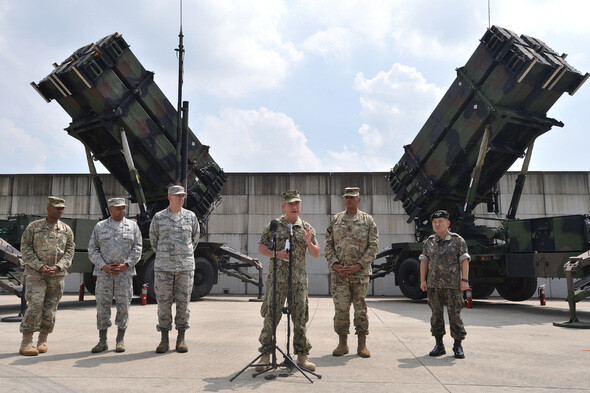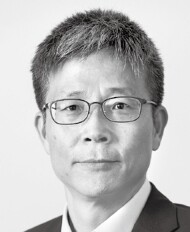hankyoreh
Links to other country sites 다른 나라 사이트 링크
[Column] Idling at the Korean embassy in Washington, D.C.

"I've never heard anything about cutting down the scale of the Ulchi Freedom Guardian exercises,” said a Ministry of Defense source.
"Korea-US joint military drills are a justifiable defense measure, but North Korea's nuclear tests and missile launches are violations of international law. Comparing a violation of international law to a defense measure is nonsense,” said a source from the Blue House who didn’t want to identified.
"Not only is a suspension Korea-US joint military exercises unacceptable, but neither is a reduction or adjustment,” added a third source from the South Korean embassy in the United States.
On Aug. 16, I heard from two sources that they'd been told of news about Donald Trump and the US federal departments making a decision to reduce the scale of the Ulchi Freedom Guardian exercises. As the two highly reliable sources provided the same tip, it was out of the question to let this information go unreported.
Yet none of the other Korean government officials I questioned had any idea of this shift by the Trump administration, either. If the sources are right, then Trump is acting contrary to his "fire and fury" remark, in spite of escalating tensions after North Korea's threat to launch an “enveloping strike” around Guam.
As each Korean government official adamantly denied knowing anything, it didn't seem like they were trying to intentionally deceive me. Yet I couldn't shake off an uneasy feeling. There had been rumors of flagging communication between Korea and the US, but would US officials really make such a major decision without consulting their Korean counterparts? Could officials in the Korean government really be this ignorant about what the United States was doing? After racking my brain, instead of definitively reporting that the Trump administration had decided to reduce and adjust Korea-US joint military exercises, I wrote an article using slightly milder language and sent it to Seoul.
Less than a day after sending my report, the Korean government released its outline for this year's joint military exercises, revealing a decrease of 7,500 American troops. Although the number of American augmented troops increased by 500 this year, troops stationed in Korea were reduced by 8,000. As 17,500 American troops are taking part in the joint exercises, a reduction of 7,500 soldiers is a significant one. Common sense tells us that the Trump administration made the sudden decision to send the same number of augmented soldiers it had promised a few months before, but reduce the number of troops stationed in Korea participating in the joint exercises.
After the article was published, claims from embassy diplomats that they had no idea seemed honest enough. One Korean government official's remark that people were "puzzled" even aroused a strain of pity. But the Defense Ministry's statement, "We can't necessarily say that the number of US troops in the exercises was reduced because the US sent more augmented troops to Korea," just sounds pathetic.
One source's comment that "perhaps the Korean government trusts the US too much" cut to the heart of the matter. That isn't to say we should completely distrust the Americans or become confrontational with them. As the Trump administration is shrouded in secrecy, it is understandably difficult to discern the true meaning behind their internal discussion. The Korean government should sharpen its senses in response, but I get the feeling that various departments and our on-site operatives are not performing well these days.
This isn't the responsibility of a few diplomats or government bureaucrats. It's been over a hundred days since President Moon took office, but the administration's appointment of its ambassadors for Japan, China, the US, and Russia is still in progress. Excuse me for having doubts, but I am not sure if the names mentioned in rumors regarding the appointment of the Korean ambassador to the US are qualified to sort this mess out. This isn't just my opinion, but the general consensus among professional acquaintances and Korean experts in Washington, D.C.

The ambassador must be named before embassy personnel movement is finalized. The embassy staff who will be on the move are just idly waiting for the Korean government to make its decision. Once the new diplomatic staff is finalized, it will take a few months for them to get settled and familiarize themselves with their American counterparts. Despite the urgency of the present situation, it appears the Moon administration's diplomatic wing won't be fully operational until after this year passes.
By Yi Yong-in, Washington correspondent
Please direct questions or comments to [english@hani.co.kr]

Editorial・opinion
![[Editorial] Intensifying US-China rivalry means Seoul must address uncertainty with Beijing sooner than later [Editorial] Intensifying US-China rivalry means Seoul must address uncertainty with Beijing sooner than later](https://flexible.img.hani.co.kr/flexible/normal/500/300/imgdb/original/2024/0517/8117159322045222.jpg) [Editorial] Intensifying US-China rivalry means Seoul must address uncertainty with Beijing sooner than later
[Editorial] Intensifying US-China rivalry means Seoul must address uncertainty with Beijing sooner than later![[Column] When ‘fairness’ means hate and violence [Column] When ‘fairness’ means hate and violence](https://flexible.img.hani.co.kr/flexible/normal/500/300/imgdb/original/2024/0516/7417158465908824.jpg) [Column] When ‘fairness’ means hate and violence
[Column] When ‘fairness’ means hate and violence- [Editorial] Yoon must stop abusing authority to shield himself from investigation
- [Column] US troop withdrawal from Korea could be the Acheson Line all over
- [Column] How to win back readers who’ve turned to YouTube for news
- [Column] Welcome to the president’s pity party
- [Editorial] Korea must respond firmly to Japan’s attempt to usurp Line
- [Editorial] Transfers of prosecutors investigating Korea’s first lady send chilling message
- [Column] Will Seoul’s ties with Moscow really recover on their own?
- [Column] Samsung’s ‘lost decade’ and Lee Jae-yong’s mismatched chopsticks
Most viewed articles
- 1[Editorial] Transfers of prosecutors investigating Korea’s first lady send chilling message
- 2[Exclusive] Unearthed memo suggests Gwangju Uprising missing may have been cremated
- 3[Column] US troop withdrawal from Korea could be the Acheson Line all over
- 4Xi, Putin ‘oppose acts of military intimidation’ against N. Korea by US in joint statement
- 5[Column] When ‘fairness’ means hate and violence
- 6[Editorial] Intensifying US-China rivalry means Seoul must address uncertainty with Beijing sooner t
- 7‘Shot, stabbed, piled on a truck’: Mystery of missing dead at Gwangju Prison
- 8Spotlight turns to Hyundai Group Chairwoman’s visit to North Korea
- 9[Column] Samsung’s ‘lost decade’ and Lee Jae-yong’s mismatched chopsticks
- 10[Column] Will Seoul’s ties with Moscow really recover on their own?